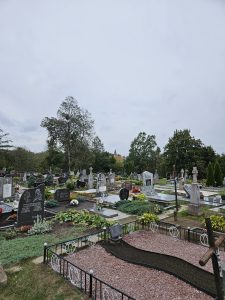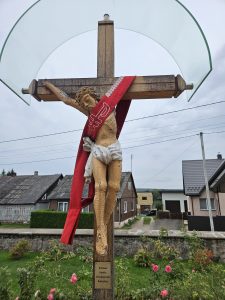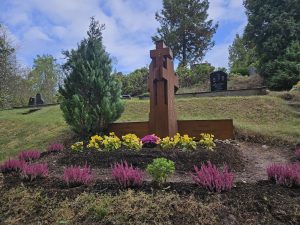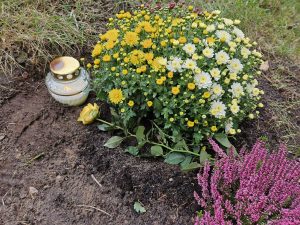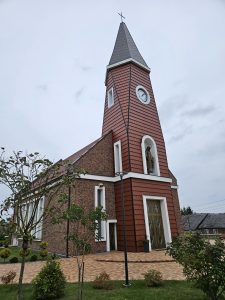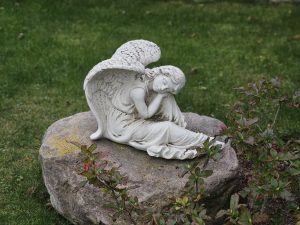The cemetery in Balbieriškis is a beautiful place, whatever the metric you choose. It is a place of peace and transcendent love that is evident in the tending of the space, the care for the ancestors. The Old Cemetery is the most beautiful of all, with its signs of age.
In the distance, the spire of Rožinio Švč. Mergelės Marijos bažnyčia, the Church of Holy Mary of the Rosary, maintains watch. This building is new, the fourth one erected on that site. The great wooden Baroque masterpiece that I remember from 2012 burned in 2013. It is a determined church, one in which one may truly have faith.
Following the Rules
I told Rymantas of my plans to bring some of Dan’s ashes to the cemetery. He, of course, consulted with Father Remigijus Veprauskas. Rymantas explained to me that ashes, by law, could not be spread on the ground, but must be buried a full meter deep. That was what we would do. That Father Remigijus would be present to offer prayers. That afterward there would be a funeral mass for Dan’s soul.
I said something about flowers and candles. Rymantas waved it all off. He would take care of it. And he would pay for the Mass.
Sigh. What is not to love about these people?
Mother Nature Weighs In
A terrible storm blew up the night before, but the sun came out for our drive-about: me, Rymantas and Gerda, our lady of translations. As we were headed home, rain came down in buckets. When it was time to go to the cemetery, the sun blazed. As we left, rain arrived to water in the beautiful chrysanthemums Rymantas had chosen. When we got to the church, sun illuminated the new stained-glass windows and filled the church with hope. Rain started up again in the evening, but nothing could dampen the jollity of that celebratory supper.
Blessings of Family
I watched as Rymantas and Gerda snipped the best blooms from the garden and placed them delicately in a bag. Then Rymantas cut a yellow, long-stemmed rose from a bush, the only rose in bloom that I could see and handed it to me. A small spade, a bucket, a bag of soil and the chrysanthemum were already in the car.
At the cemetery Gerda popped out to fill a couple of bottles with water. This chrysanthemum would be planted to survive for eternity.
A hole was dug, right by where I imagined Bronė’s shoulder would be, where any of us might want to lay our head. Rymantas suggested a couple of places for Dan, and this, we agreed, was the right one, where she could watch over Dan. Bronė, the mother of Rymantas, was also Dan’s cousin, the niece of his mother and her namesake.
Such extraordinary, rich black soil. This is the soil that the Soviet Union coveted and put Lithuanians to work on, growing food that was only ever shipped to Moscow. Rymantas discarded two immense buckets of dirt beyond the fence; I coveted that dirt, too. For my garden in Maryland. Then he carefully laid about half of the blossoms, selecting a variety of colors, making a bed just so.
A Graveside Service
Father Remigijus arrived with his purple stole, the aspergillum of holy water and his prayer book. We arrayed ourselves around the grave as the prayers I didn’t understand gave me comfort. When it was time, I poured the ashes into the hole, onto the bed of flowers. Gerda placed the last blossoms on top and Rymantas covered it all with soil from around the edge.
Then he brought fresh new soil to fill the hole, creating a hollow for the chrysanthemums, which Gerda moistened with the water from her bottles. The flowers were planted, the dirt tamped down around their roots; I laid the yellow rose beside them. Gerda lit three candles, one for Motijus Sidaravičius, one for Bronė Levinskiutė Sidaravičiene, and one for Daniel Tamkus.
Funeral Mass
I had not yet been inside the new church. I had seen a video of the consecration and a documentary, Hope and Miracle in Balbieriškis. https://www.youtube.com/watch?v=60CTj8nl9Go The congregation was small. Apart from the three of us, just one man and a few women, parishioners who dedicated themselves to serving every funeral mass.
The rhythms were familiar from my Episcopal past. It was obvious when to rise and when to kneel. No hymns, of course, but a beautiful long song at the end from the women. It sounded almost pagan, sweet in a minor key, and their voices were strong and harmonious.
Always Food and Drink
Angelė, of course, was at home preparing a feast for the hordes, which would be the three of us plus Gerda, Remigjus and Neringa, who had handled translation chores before Gerda. Filets of salmon and chicken were heaped on beds of buckwheat and rice, alongside mixed vegetables. A massive salad of greens, peppers, tomatoes, olives and parmesan cheese already sat on the table. Savory pastries stuffed with lamb came out of the oven.
Dan would have loved this feast. Sveikas!
The Real Farewell
After lunch the next day, I hugged Rymantas and Angelė, wiped tears, and headed to Miežonys and Dan’s paternal people.
First, I stopped at the church to walk around it, a circuit I had not yet made.
Then I returned to the cemetery and to Dan to tell him to mind Bronė. To tell him how much I mourn him. How much it means to me that that country home by a river, here the Peršėkė. That the farm that lay be the water’s edge had belonged to the family.
Finally, I said goodbye.

